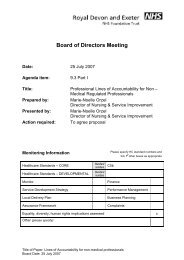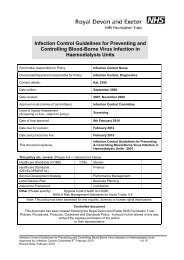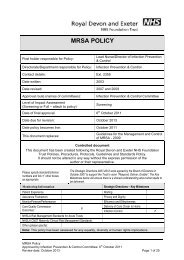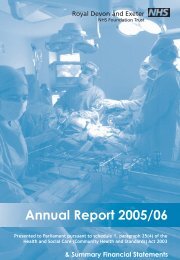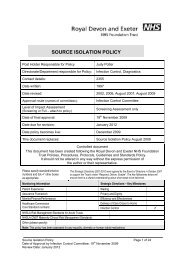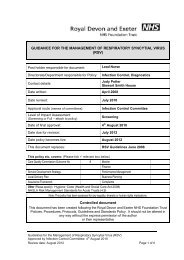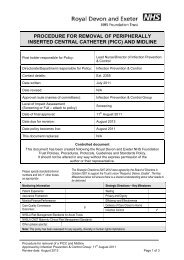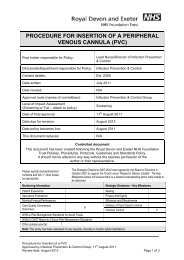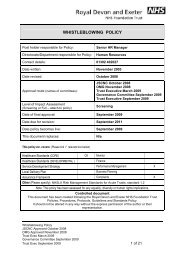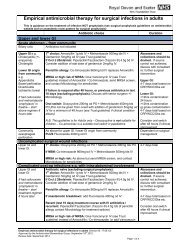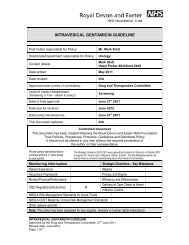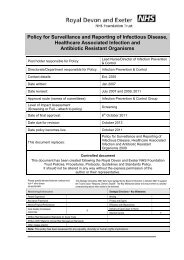Annual Report and Accounts 2012/13 - Royal Devon & Exeter Hospital
Annual Report and Accounts 2012/13 - Royal Devon & Exeter Hospital
Annual Report and Accounts 2012/13 - Royal Devon & Exeter Hospital
You also want an ePaper? Increase the reach of your titles
YUMPU automatically turns print PDFs into web optimized ePapers that Google loves.
28 2. Progress on our<br />
<strong>2012</strong>/<strong>13</strong> Priorities<br />
<strong>Royal</strong> <strong>Devon</strong> <strong>and</strong> <strong>Exeter</strong> NHS Foundation Trust<br />
Quality <strong>Report</strong> <strong>2012</strong>/<strong>13</strong><br />
CASE STUDY<br />
Safety, clinical effectiveness <strong>and</strong><br />
patient experience<br />
Patient story, as told by Stephen Dinniss<br />
"After thinking I was<br />
cured, after seven<br />
years clear, I was<br />
diagnosed with a<br />
recurrence of bowel<br />
cancer in March 2011.<br />
Following further<br />
chemo-radiotherapy the tumour<br />
was felt to not be curable <strong>and</strong><br />
no surgical options were felt<br />
to be appropriate. However,<br />
following a chance meeting<br />
between several clinicians<br />
whose opinions I had sought,<br />
<strong>and</strong> the publication of an<br />
article in a surgical journal from<br />
Denmark describing a more<br />
radical approach to surgery, I<br />
was offered the opportunity to<br />
consider a hemipelvectomy to<br />
treat the cancer. The operation<br />
would mean the amputation of<br />
my right leg <strong>and</strong> removal of the<br />
right hip as well as many of the<br />
pelvic organs. It had never been<br />
undertaken in the UK before,<br />
with just twelve described in the<br />
Danish article.<br />
I understood it represented a huge<br />
challenge <strong>and</strong> dilemma for both<br />
myself <strong>and</strong> the hospital <strong>and</strong> required<br />
significant consideration <strong>and</strong> planning.<br />
I was therefore given the opportunity<br />
to meet with the main clinicians<br />
involved to aid in making the decision<br />
<strong>and</strong> once we had decided to proceed,<br />
we were kept abreast of ongoing<br />
developments <strong>and</strong> planning. We were<br />
aware of meetings between managers<br />
<strong>and</strong> clinicians as well as involvement<br />
of Commissioners <strong>and</strong> the PCT. As a<br />
result we were asked to meet with the<br />
Medical Director to ensure we fully<br />
understood the significance of our<br />
decision; <strong>and</strong> on his suggestion it was<br />
arranged for a surgeon from Denmark,<br />
with experience of the operation, to<br />
be brought to <strong>Exeter</strong> to be involved.<br />
We also met most of the seven<br />
surgeons <strong>and</strong> anaesthetists, as well as<br />
physios <strong>and</strong> occupational therapists,<br />
who would be involved, <strong>and</strong> had the<br />
opportunity to ensure all our questions<br />
were answered in advance.<br />
The operation itself I remember<br />
nothing of, <strong>and</strong> little of the following<br />
period. I was aware, though, that<br />
many decisions about where my<br />
care was based, <strong>and</strong> who would<br />
lead it were made before the<br />
operation. I subsequently felt secure<br />
in underst<strong>and</strong>ing the plan to remain<br />
on ITU before moving to the plastic<br />
surgical ward.<br />
I remained in hospital for around<br />
five weeks <strong>and</strong> throughout that<br />
time my care was well co-ordinated<br />
<strong>and</strong> delivered, a testament to the



